Medical Marijuana for Irritable Bowel Syndrome: Discover How Cannabis is Helping Relieve the Symptoms of IBS

What You Need to Know: Medical Cannabis and IBS
Cannabis has shown promise as a potential treatment for Irritable Bowel Syndrome (IBS), a gastrointestinal disorder characterized by abdominal pain, bloating, and changes in bowel habits. The endocannabinoid system (ECS), which plays a role in regulating various physiological processes, including gastrointestinal function, is activated by cannabinoids found in cannabis. Cannabidiol (CBD) and Δ9-tetrahydrocannabinol (THC) are two primary cannabinoids that have demonstrated anti-inflammatory and analgesic properties, offering potential relief for IBS symptoms.
Research suggests that cannabis may help alleviate abdominal pain, reduce inflammation in the gastrointestinal tract, and modulate intestinal motility in individuals with IBS. However, the effectiveness of cannabis in treating IBS can vary among individuals, and more clinical studies are needed to understand the specific mechanisms and long-term implications of cannabis use for IBS management. Additionally, it is essential to consider individual responses, potential side effects, and legal regulations surrounding the use of cannabis in different regions.
The Science Behind Medical Cannabis for IBS
- IBS and Clinical Endocannabinoid Deficiency (CED)
- Potential Benefits of Medical Cannabis for IBS Symptoms
- Potential Benefits of Medical Cannabis for IBS Symptoms
- Important Considerations Before Using Cannabis for IBS
- Understanding the Different Types of IBS
- IBS and Medical Cannabis: A Neuroscience Researcher Weighs in
How do some irritable bowel syndrome (IBS) patients turn to medical marijuana for symptom relief? Everyone has an endocannabinoid system in their body. Endocannabinoids are fat-based neurotransmitters that the body produces. Endocannabinoids are responsible for a variety of bodily functions including modulating inflammation, immune system function, and neurotransmitters. The most well-known self-made endocannabinoids are anandamide (AEA) and 2-arachidonoylglycerol (2-AG).
The cannabinoids found in the cannabis plant, including Δ9-tetrahydrocannabinol (THC) and cannabidiol (CBD), can activate the endocannabinoid system in the body and may help resolve chronic pain, migraines, abdominal pain, bloating, and other issues. Cannabis activates cannabinoid receptors, including CB1 receptors found in the central nervous system and CB2 receptors that are found in organs, muscles, and other bodily tissues. Cannabinoids can directly influence the quantities of the AEA and 2-AG endocannabinoids found in the body along with the body’s ability to maintain homeostasis.
CB1 receptors are responsible for large and small bowel muscle tone and slowing peristalsis, or digestion in the intestines (3). Activation of the CB2 receptors also plays a role in IBS by targeting immune cells in the intestines, which reduces visceral intestinal pain and has anti-inflammatory effects.
Cannabinoids can also interact with families of other receptors that can also influence normal gastrointestinal tract functions like stomach emptying, motility, immunity and inflammation, microbiome balance, and gut-brain communication (13). Read on to learn more about CED and this condition.
For more information on how the endocannabinoid system works, please see our page on endocannabinoids here.
IBS and Clinical Endocannabinoid Deficiency (CED)
Recent research on the endocannabinoid system suggests that many irritable bowel patients may have clinical endocannabinoid deficiency (CED). This has been shown through studies examining AEA and 2-AG levels found in spinal fluid. Researchers theorize that these deficiencies could come from genetic or congenital reasons or can be acquired from injuries or diseases (11).
IBS is characterized by severe abdominal pain, bloating, cramping, and a significant change in bowel movements. Scientists have found that CED is strongly evident in patients who have IBS, migraines, and fibromyalgia. Researchers believe that when it comes to irritable bowel “optimal gut health without pain and with maintenance of appropriate body weight seems to require a complex interplay between diet, enteric flora, and endocannabinoid balance” (11).
Research on obese mice has shown that there is an interplay of the microbiome-gut-brain axis. This means the microbiome biome of the small intestine, large intestine, and brain health are important factors in treating this condition. The obese mice that were given doses of THC had a favorably altered microflora in the gut which prevented them from gaining more weight on a high-fat diet compared to mice who did not receive it (11).
Check out our article on clinical endocannabinoid deficiency for more information.
Potential Benefits of Medical Cannabis for IBS Symptoms
Medical cannabis can help patients with pain relief, bowel movement issues, and reduce inflammation. Stress and anxiety have also been found to have a connection to IBS. Cannabis and CBD use can help reduce anxiety stress, another aggravating factor in this condition, in addition to modulating CED (3).
There is a lot of anecdotal evidence that the use of medical marijuana may relieve the symptoms of irritable bowel syndrome, but there is very little clinical evidence that supports its use (3). Thankfully, through research, we are seeing the number of clinical trials in this area grow, but further research is needed to connect marijuana use to symptom relief in this population.
A small study published in Cannabis and Cannabinoid Research examined the effect of CBD chewing gum on 32 female patients. This randomized, double-blind, and placebo-controlled trial looked at the effect of chewing gum containing 50 mg of CBD against placebo gum (13). This study showed no significant differences in abdominal pain perception for the CBD gum in comparison to the placebo.
It is important to note that there were many limitations to the study design because of the lack of male participants as well as the fact that chewing gum stimulates digestion (13). However, this study would be interesting to replicate in a larger population of IBS patients with other delivery methods for the CBD.
Important Considerations Before Using Cannabis for IBS
It is important to talk with your doctor about using cannabis or CBD as drug interactions can occur and a doctor can advise you on beginning doses. Patients benefit from taking THC in the evenings or as needed for intestinal pain and inflammation. Some patients benefit from taking CBD daily without any THC. In addition, THCA and CBDA may also help patients see improvements with low doses (8).
Terpenes are the chemicals found in cannabis that are responsible for smells and flavors. The following terpenes may also help with some IBS symptoms (8):
- Terpinolene
- Caryophyllene, also known as beta-caryophyllene
- Limonene
- Pinene
Check out our guide on terpenes to learn more.
It may take eight to 12 weeks to experience significant symptom improvements using THC and CBD for IBS, but many people report symptom improvements in the first 2-3 weeks. Depending on what foods trigger your symptoms, you may want to stay away from edibles or read the packaging thoroughly to avoid triggering ingredients (8).
The pathology of IBS is not fully understood. According to a study discussing the endocannabinoid system and IBS: “Currently, IBS sufferers are prescribed opioids, anticholinergics, and antidepressants, however with quite suboptimal results (3).” There are also treatments that alter the body’s serotonin levels, but these medications carry the risk for side effects and other adverse events such as ischemic colitis or cardiovascular events (3).
It is important to note that irritable bowel syndrome is not the same as inflammatory bowel disease (IBD). Please check out our pages on ulcerative colitis and Crohn’s disease for more information and the effects of cannabis.
Understanding the Different Types of IBS
The following details the different types of irritable bowel, and how they may affect your body and digestive system (12):
IBS with Diarrhea (IBS-D)
- Patients have diarrhea more than 25% of the time and hard stools less than 25% of the time
IBS with Constipation (IBS-C)
- Patients have hard stools more than 25% of the time and loose stools less than 25% of the time
Mixed IBS (IBS-M)
- Patients have both hard and soft stools more than 25% of the time
- Accounts for 33% to 50% of all IBS cases
Post-Diverticulitis IBS
- Occurs after diverticulitis symptoms
- Patients experience left-sided abdominal pain
- Inflammatory mass in the lower left abdomen
Post-Infectious IBS
- Occurs after an intestinal infection or virus
Unclassified IBS (IBS-U)
- Characterized by patients who meet diagnostic criteria of IBS, but bowel habits do not fit into the other subtypes
IBS and Medical Cannabis: A Neuroscience Researcher Weighs in
The Veriheal team had the opportunity to speak with Dr. Viola Brugnatelli, a neuroscience researcher and endocannabinologist. Dr. Brugnatelli became a researcher in 2012 and her interests lie in the interaction between natural products (such as plants and spices) and the nervous system. Dr. Brugnatelli co-founded Cannabiscienza, an innovative society dedicated to scientific training on the endocannabinoid system and medicinal cannabis.
Let’s take a look at what Dr. Brugnatelli has to say about IBS and cannabis.
Q: What is the gut-brain axis alteration in IBS?
“The interaction of the microbiome-gut-brain axis is highly dependent on hypothalamic–pituitary–adrenal (HPA) stress modulation, which is dysregulated in IBS patients. The ECS regulates basal and circadian HPA axis activation, and these changes relate to the differences in the visceral sensation that feature in IBS.”
Q: How might THC and CBD be able to modulate it?
“We know that chronic stress causes loss of CB1 receptors, activation of the HPA stress response, and anxiety…Activating CB1 with THC may be recommended in IBS patients to improve abdominal spasms, cramps, and visceral pain. Furthermore, given that endocannabinoid receptors are found along the GI tract, it follows logically that CBD and THC could reduce clinical endocannabinoid deficiency, and improve symptoms of IBS.”
Q: How would this benefit those living with IBS?
“Currently, IBS sufferers are prescribed opioids, anticholinergics, and antidepressants, however with quite suboptimal results. In this context targeting the ECS may represent a promising strategy to modulate gut motility…low-grade intestinal inflammation, and gut-brain axis alteration, all features that may improve IBS symptoms onset. It is also evident that both an IBS diet and a stress-relief practice are required to boost the beneficial effects of any of the agents suggested.”
Dr. Brugnatelli’s research suggests that medical marijuana is a safe and effective option for reducing endocannabinoid deficiency for patients struggling with IBS. As more research emerges, it is hopeful medical professionals will consider the use of medical marijuana for those suffering from this condition.
Note: Veriheal does not intend to give this as professional medical advice. Do not attempt to self-diagnose or prescribe treatment based on the information provided on this page. Always consult a physician before making any decision on the treatment of a medical condition.
1. Bashashati, M., & McCallum, R. (2019, November 21). Cannabis in gastrointestinal disorders. Retrieved February 12, 2021, from https://practicalgastro.com/2014/12/18/cannabis-in-gastrointestinal-disorders/
2. Borrelli, F., Fasolino, I., Romano, B., Capasso, R., Maiello, F., Coppola, D., . . . Izzo, A. (2013, February 12). Beneficial effect of the non-psychotropic plant cannabinoid cannabigerol on experimental inflammatory bowel disease. Retrieved February 12, 2021, from https://www.sciencedirect.com/science/article/abs/pii/S0006295213000543
3. Brugnatelli, V., Turco, F., Freo, U., & Zanette, G. (2020). Irritable Bowel Syndrome: Manipulating the Endocannabinoid System as First-Line Treatment. Frontiers in neuroscience, 14, 371.https://www.frontiersin.org/articles/10.3389/fnins.2020.00371/full
4. Cryan, J. F., & O’Mahony, S. M. (2011). The microbiome-gut-brain axis: from bowel to behavior. Neurogastroenterology and motility : the official journal of the European Gastrointestinal Motility Society, 23(3), 187–192. https://onlinelibrary.wiley.com/doi/10.1111/j.1365-2982.2010.01664.x
5. Esposito, G., Filippis, D. D., Cirillo, C., Iuvone, T., Capoccia, E., Scuderi, C., Steardo, A., Cuomo, R., & Steardo, L. (2013). Cannabidiol in inflammatory bowel diseases: a brief overview. Phytotherapy research : PTR, 27(5), 633–636. https://onlinelibrary.wiley.com/doi/10.1002/ptr.4781
6. Fichna, J., Sałaga, M., Stuart, J., Saur, D., Sobczak, M., Zatorski, H., Timmermans, J.‐.‐P., Bradshaw, H.B., Ahn, K. and Storr, M.A. (2014), Selective inhibition of FAAH produces antidiarrheal and antinociceptive effect mediated by endocannabinoids and cannabinoid‐like fatty acid amides. Neurogastroenterol. Motil., 26: 470-481. https://onlinelibrary.wiley.com/doi/full/10.1111/nmo.12272
7. Giulia Di Carlo & Angelo A Izzo (2003) Cannabinoids for gastrointestinal diseases: potential therapeutic applications, Expert Opinion on Investigational Drugs, 12:1, 39-49, https://www.tandfonline.com/doi/abs/10.1517/13543784.12.1.39
8. Goldstein, B. (2020, September 28). Cannabis for gastrointestinal disorders. Retrieved February 12, 2021, from https://www.projectcbd.org/medicine/cannabis-gastrointestinal-disorders
9. Pandey, S., Kashif, S., Youssef, M., Sarwal, S., Zraik, H., Singh, R., & Rutkofsky, I. (2019, November 13). Endocannabinoid system in irritable bowel syndrome and cannabis as a therapy. Retrieved February 12, 2021, from https://www.sciencedirect.com/science/article/abs/pii/S0965229919310179
10. Russo E. B. (2004). Clinical endocannabinoid deficiency (CECD): can this concept explain therapeutic benefits of cannabis in migraine, fibromyalgia, irritable bowel syndrome and other treatment-resistant conditions?. Neuro endocrinology letters, 25(1-2), 31–39. https://pubmed.ncbi.nlm.nih.gov/15159679/
11. Russo E. B. (2016). Clinical Endocannabinoid Deficiency Reconsidered: Current Research Supports the Theory in Migraine, Fibromyalgia, Irritable Bowel, and Other Treatment-Resistant Syndromes. Cannabis and cannabinoid research, 1(1), 154–165. https://www.liebertpub.com/doi/10.1089/can.2016.0009
12. Types of ibs – irritablebowelsyndrome.net. (2016, May 16). Retrieved February 12, 2021, from https://irritablebowelsyndrome.net/what-is-ibs/types-of-ibs/
13. Van Orten-Luiten, A.-C. B., de Roos, N. M., Majait, S., Witteman, B. J. M., & Witkamp, R. F. (2021). Effects of Cannabidiol Chewing Gum on Perceived Pain and Well-Being of Irritable Bowel Syndrome Patients: A Placebo-Controlled Crossover Exploratory Intervention Study with Symptom-Driven Dosing. Cannabis and Cannabinoid Research. https://www.liebertpub.com/doi/10.1089/can.2020.0087








